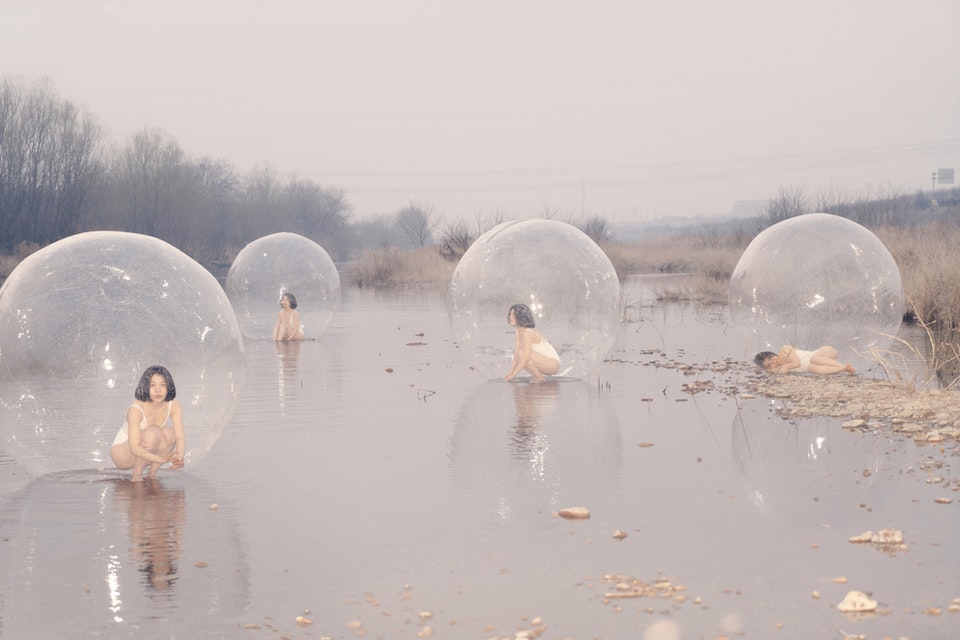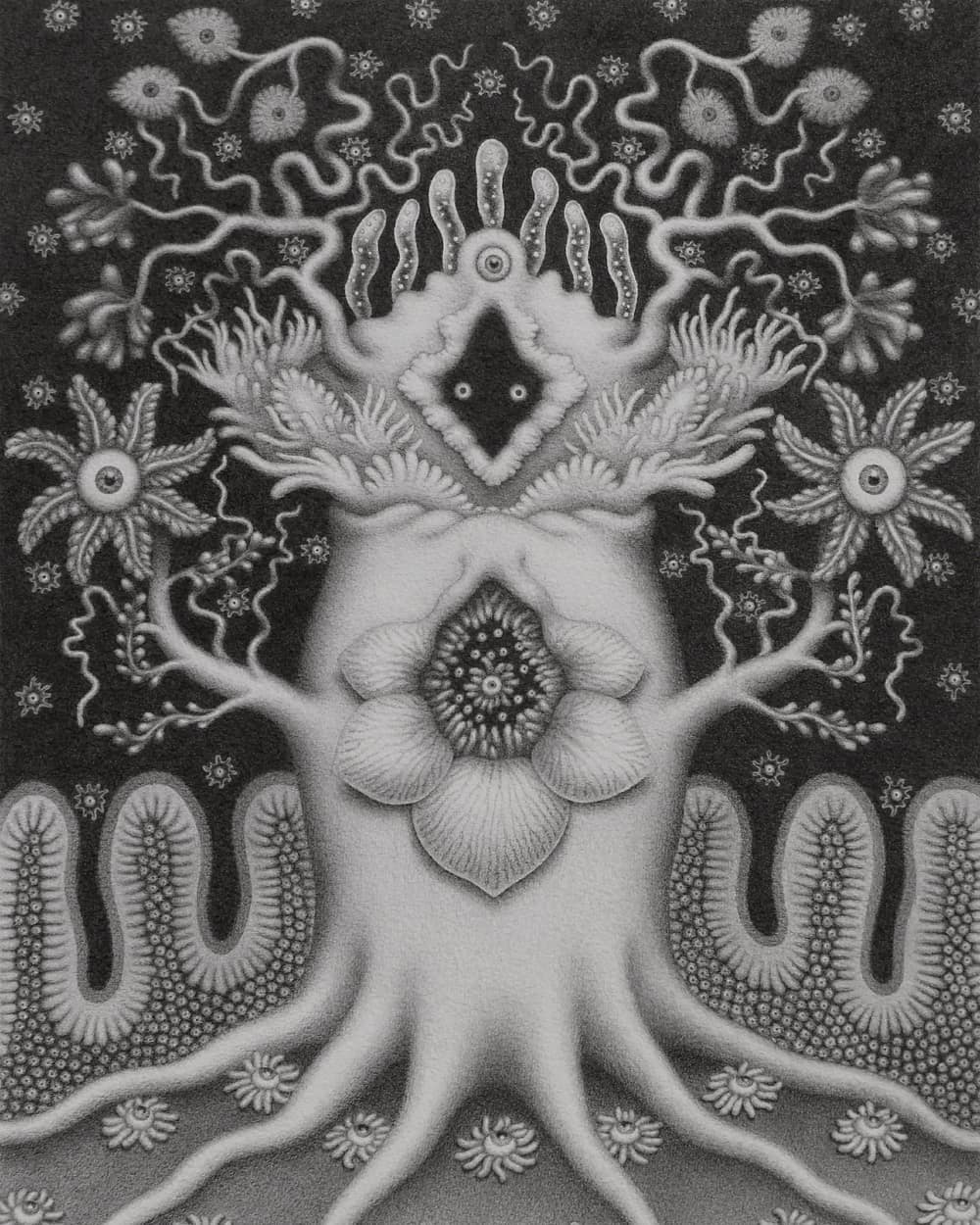Sea, Sihanoukville, Wrapped Future II Series
2018 - Photography (Photography)
104 x 156 cm
Lim Sokchanlina
The photographic series Wrapped Future II by Lim Sokchanlina brings fences used on construction sites to enclose the surrounding areas, to different locations, lakes, valleys and forests; and places them at the center of works to obscure the beautiful Cambodian landscape. The inharmonious landscape is gradually captivated by the exquisite balance between inorganic material and mystical background. The photos were taken in places that in recent years have become targets of large-scale exploitation under a massive globalization of capital and other political interests. Using the fences as a symbol of change, Sokchanlina’s work warns of an uncertain future where local realities with their communities, culture, and nature will slowly fade away. – Text by Sachiko Iwase
Lim Sokchanlina, nicknamed ‘Lina’, works across documentary and conceptual practices with photography, video, installation, and performance; particularly drawn to the use and function of space where urban communities meet rural attitudes. Using different strategies, he calls attention to various social, political, geopolitical, economic, cultural, and environmental changes in Cambodia, and in relation to the globe. Lim Sokchanlina also belongs to a Khmer generation critically aware of the need to inform Cambodian youth of their cultural, social, and political histories. His work raises questions about the role of power and economics in our everyday living and contemporary present and usually involves research to discover, unpack, and record the present’s history and the future’s imagination by learning from the past. Growing up in a society decimated by the affects of the Khmer Rouge and its anti-intellectualization, a violent civil war that killed millions, Lina co-founded Stiev Selapak / Art Rebels, in 2007 (an initiative which gave subsequent birth to exhibition space ‘Sa Sa Art Projects’ and commercial space ‘Sa Sa Bassac’) – a community within Southeast Asia well-known for their activities raising local awareness of civic, environmental and cultural injustice. – Text by Sa Sa Bassac and Zoe Butt
Colors:
Related works sharing similar palette

© » KADIST
Oren Pinhassi
2020Oren Pinhassi’s work examines the relationship between the human figure and the built environment...

© » KADIST
Bruce Conner
1995Bruce Conner is best known for his experimental films, but throughout his career he also worked with pen, ink, and paper to create drawings ranging from psychedelic patterns to repetitious inkblot compositions...

© » KADIST
Allen Ruppersberg
1970Untitled (City Limits) is a series of five black-and-white photographs of road signs, specifically the signs demarcating city limits of several small towns in California...

© » KADIST
Yuki Kimura
2012Kastura (2012) is an installation consisting of 24 black-and-white photographs of the Katsura Imperial Villa in Kyoto bequeathed by Kimura’s grandfather; free-standing structures on which they are hung; and ornamental plants...

© » ARTFORUM
Drawing Center Names Olivia Shao Inaugural Burger Collection & TOY Meets Art Curator – Artforum Read Next: AMY HAU TO LEAD NOGUCHI MUSEUM Subscribe Search Icon Search Icon Search for: Search Icon Search for: Follow Us facebook twitter instagram youtube Alerts & Newsletters Email address to subscribe to newsletter...

© » KADIST
Robert Zhao Renhui
2014Created during Zhao Renhui’s residency at Kadist SF in 2014, the photographic grid features a selection of some 6,000 members from single family of flies –hoverfly– identified over the last 25 years by Sacramento-based Dr...

© » KADIST
Daniel Boccato
2017Birdstones is a series of flat concrete slabs made from moldings of different shapes, each with two small holes...

© » KADIST
Allora & Calzadilla
This installation combines the display of real objects with the deceptively painterly amalgamation of their content as the subject of a photograph...

© » HYPERALLERGIC
Met Museum to Return 16 Looted Khmer Artifacts Skip to content Unknown artist, "Head of Buddha" (7th century), sandstone, 24 x 13 x 12 3/4 inches (all photos courtesy the Metropolitan Museum of Art) An ancient larger-than-life sandstone Buddha head, a bronze sculpture of a seated Bodhisattva Avalokiteshvara, and a 10th-century goddess statuette from a remote temple complex are among 16 looted Khmer works currently in the process of repatriation back to Cambodia and Thailand, according to announcements by the Metropolitan Museum of Art and the US Attorney’s Office for the Southern District of New York (SDNY) released today, December 15...

© » ARTFORUM
Title, Theme Announced for Sixth Aichi Triennale – Artforum Read Next: ART BASEL REVEALS EXHIBITOR LIST FOR 2024 SWISS FAIR Subscribe Search Icon Search Icon Search for: Search Icon Search for: Follow Us facebook twitter instagram youtube Alerts & Newsletters Email address to subscribe to newsletter...

© » KADIST
Nicolás Paris
2012Nicolas Paris studied architecture and worked as an elementary school teacher before he decided to become an artist...

© » KADIST
Milena Bonilla
2009Milena Bonilla’s discursive practice explores connections among economics, territory, and politics through everyday interventions...

© » WHITEHOT
Matthew Barney’s REPRESSIA (decline) at the Los Angeles County Museum of Art advertise donate post your art opening recent articles cities contact about article index podcast main December 2023 "The Best Art In The World" "The Best Art In The World" December 2023 Matthew Barney’s REPRESSIA (decline) at the Los Angeles County Museum of Art Matthew Barney, Cremaster 5 (production still), 1997 (fig...

© » KADIST
Sheroanawe Hakihiiwe
2019Wateoma husipe / Larvas de oruga / Caterpillar larvae by Sheroanawe Hakihiiwe exemplify his most abstract work, where he choses particular elements of a living organism to create his renditions...

© » KADIST
Zach Reini
2015Particularly shaped by his own youth in the 1990s, his recent works have incorporated things like a marijuana leaf, a dragon-emblazoned chain wallet, metal grommets, and the ubiquitous (in the 90s) Stussy symbol...

© » 1854 PHOTOGRAPHY
Now on show in New York City: BJP's Female in Focus winners - 1854 Photography Subscribe latest Agenda Bookshelf Projects Industry Insights magazine Explore ANY ANSWERS FINE ART IN THE STUDIO PARENTHOOD ART & ACTIVISM FOR THE RECORD LANDSCAPE PICTURE THIS CREATIVE BRIEF GENDER & SEXUALITY MIXED MEDIA POWER & EMPOWERMENT DOCUMENTARY HOME & BELONGING ON LOCATION PORTRAITURE DECADE OF CHANGE HUMANITY & TECHNOLOGY OPINION THEN & NOW Explore Stories latest agenda bookshelf projects theme in focus industry insights magazine ANY ANSWERS FINE ART IN THE STUDIO PARENTHOOD ART & ACTIVISM FOR THE RECORD LANDSCAPE PICTURE THIS CREATIVE BRIEF GENDER & SEXUALITY MIXED MEDIA POWER & EMPOWERMENT DOCUMENTARY HOME & BELONGING ON LOCATION PORTRAITURE DECADE OF CHANGE HUMANITY & TECHNOLOGY OPINION THEN & NOW © Minxu Li, Female in Focus 2022 single image winner BJP’s new exhibition takes place in a converted Brooklyn townhouse, reflecting the award’s domestic focus The winners of BJP ’s Female in Focus 2022 include two series and 20 single images which demonstrate the sheer power of photography by women...




